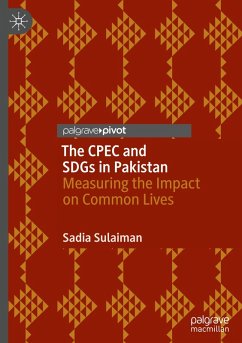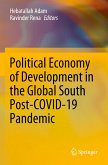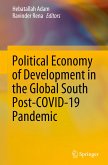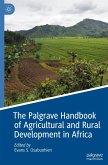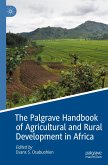The China-Pakistan-Economic Corridor (CPEC) is the flagship project of Belt and Road Initiative by China. This project has attracted much of the focus and attention owing to its geostrategic significance where it connects China with Pakistan through the strategic port of Gwader and through a network of road and rail connection, henceforth improving China's and Pakistan's outreach in the Asian, African and European markets.
This study takes a new direction and examines the development of CPEC projects across Pakistan by choosing six projects in both rural and urban areas and their impact on the daily lives of people as reflected in three crucial Sustainable Development Goals (SDGs) encapsulated by the United Nations-good health and wellbeing, inclusive and equitable quality education, and decent work and economic growth (SDGs 3, 4, and 8, respectively).
This is a new approach used to study the impact of the CPEC beyond geopolitics and for the common people in Pakistan who are directly or indirectly affected by various CPEC projects. This is under studied aspect of the literature on CPEC and this monograph adequately fills the gap in literature.
The study takes a deep dive into 6 CPEC projects i.e., Sahiwal Coal Power Plant, Orange Line Metro Train, Lahore, Rasahkai Special Economic Zone, Peshawar-D.I.Khan Motorway, Kohala Hydro Power Project and Neelum-Jehlum Power project to understand how these projects have affected the lives of common people through their impact on SDGs 3,4 and 8. For the first time people's centric approach has been adopted to evaluate the development impacts of the CPEC.
This study takes a new direction and examines the development of CPEC projects across Pakistan by choosing six projects in both rural and urban areas and their impact on the daily lives of people as reflected in three crucial Sustainable Development Goals (SDGs) encapsulated by the United Nations-good health and wellbeing, inclusive and equitable quality education, and decent work and economic growth (SDGs 3, 4, and 8, respectively).
This is a new approach used to study the impact of the CPEC beyond geopolitics and for the common people in Pakistan who are directly or indirectly affected by various CPEC projects. This is under studied aspect of the literature on CPEC and this monograph adequately fills the gap in literature.
The study takes a deep dive into 6 CPEC projects i.e., Sahiwal Coal Power Plant, Orange Line Metro Train, Lahore, Rasahkai Special Economic Zone, Peshawar-D.I.Khan Motorway, Kohala Hydro Power Project and Neelum-Jehlum Power project to understand how these projects have affected the lives of common people through their impact on SDGs 3,4 and 8. For the first time people's centric approach has been adopted to evaluate the development impacts of the CPEC.

